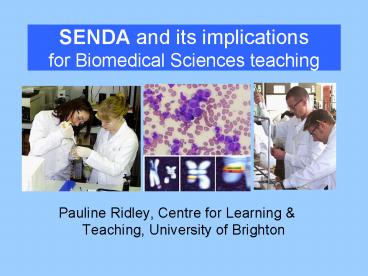SENDA and its implications for Biomedical Sciences teaching - PowerPoint PPT Presentation
1 / 15
Title:
SENDA and its implications for Biomedical Sciences teaching
Description:
Special Educational Needs and Disability Act 2001 ... Access to fixed equipment (eg fume cupboards) Lighting. Accommodation for helpers or guide dogs ... – PowerPoint PPT presentation
Number of Views:64
Avg rating:3.0/5.0
Title: SENDA and its implications for Biomedical Sciences teaching
1
SENDA and its implicationsfor Biomedical
Sciences teaching
- Pauline Ridley, Centre for Learning Teaching,
University of Brighton
2
Quick reminder SENDA Special Educational Needs
and Disability Act 2001
- Part IV of the Disability Discrimination Act -
covers education (excluded from 1995 DDA) - Obliges HEIs to make reasonable adjustments to
ensure that disabled students are not
substantially disadvantaged in comparison to
other students. - Requires universities to be pro-active, and to
anticipate the needs of potential students.
3
Justifications for exceptions
- Academic standards No compromise or reduction of
standards in general or essential requirements of
the subject or course (as identified in programme
specifications subject benchmarking statement) - Professional body restrictions/ requirements
- Institute of Biomedical Science
- Health Professions Council
- Material and substantial reasons why an
adjustment may not be made (eg cost, major
disruption) - but this should not be used as
blanket excuse to avoid exploring creative
solutions
4
Some statistics (with health warning)
- Categories by UCAS code All subjects
Subjects allied to Medicine - Biological Sciences
- Disabled students as percentage of total 4.6
- Within this group
- 1 Dyslexia /other SLD 36.3
- 2 Blind/partially sighted 3.7
- 3 Deaf /hearing impaired 6.4
- 4 Mobility difficulties 5.1
- 6 Mental health difficulties 4.2
- 7 Unseen (usually medical) 24.7
- 8 Multiple 7.1
- 9 Other 12.5
- T (from 2002)Autism spectrum disorder
5
What action should we take?
- For individual students
- Dont make assumptions about student needs -
always ask! - Review information systems
- Common cause of problems. Need good communication
between student, academic support staff
clear guidelines on disclosure - Anticipatory duty
- Review programmes from recruitment to final
assessment - Action plan - potential difficulties, solutions,
queries, resource needs?
6
Lectures, seminars, tutorials
- Accessibility and layout of rooms
- Session notes and summaries
- available in class? in advance? electronically?
- Staff awareness and training for adjustments in
teaching style eg - Management of in-class discussion
- Audibility RNID Guidelines on working with
lip-readers/ signers/ note-takers - Visibility (lighting etc) alternative
formats for visual aids
7
Tactile Diagrams
- National Centre for Tactile Diagrams at
http//www.nctd.org.uk/ provide a range of
services and materials to help academics in
presenting graphical information.
8
Laboratories workshops
- Common issues
- Access
- Health Safety
- Information
- Participation
- Assessment
- Eliminating unnecessary obstacles while
maintaining rigour demands clarity over - Core course requirements
- Real function of lab work in these
9
Labs workshops - Access
- General access audit should include
- Physical access to (and safe exit from) labs
- Space between benches
- At least one adjustable height work station
- Position of power points, taps, other controls
- Access to fixed equipment (eg fume cupboards)
- Lighting
- Accommodation for helpers or guide dogs
- Resource implications of adjustments?
10
Labs workshops - Health Safety
- Procedure for individual risk assessments
- Some medical conditions/ biological hazards?
- Individual inductions to labs/equipment
- Housekeeping system to prevent obstructions,
spillages other hazards - Nominated individual responsible for safety of
disabled student? - Safety notices in accessible formats
- Audible/visible alarms and safety devices
- Adaptations to standard protective equipment
11
Labs workshops - Information
- Staff awareness and training (including part-time
staff, postgraduate assistants) - Notices in labs encouraging disclosure
- Lab information in different formats
- Advance discussions between student and staff
(academic/technical /disability advisors) - Course information/ experimental protocols in
advance so student can prepare - Regular monitoring who is responsible?
12
Labs workshops - Participation
- Possible adjustments might include
- Equipment adaptations
- Further Resources articles for cheap /simple
ideas - TechDis database of assistive technology
- Support worker and/or buddy system
- Use of tape recorder for lab notes
- Extra time (with supervision)
- Virtual experiments/ simulations
13
Assessment
- Assessment adjustments include
- Extra time/ flexibility around deadlines
- Minor variations to format
- Use of helpers or technology for exams or
practical assessments, help with access - If part of everyday study arrangements, should
normally be permitted - Alternative assessment tasks
14
Alternative assessment tasks
- Australian experience
- More inclusive assessment design led to 70 drop
in requests for special arrangements - Clarity over what we really want to assess helps
in choosing alternative tasks - subject knowledge?
- practical skills?
- key skills eg communication?
- Is the same option available to all students?
- Principle of equality, wider use helps develop
staff expertise, improves consistency and rigour
15
Further Information
- Institutional Disability Services
- Professional Bodies
- LTSN Centres
- Further Resources Handout































